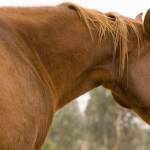Monitor, Protect Against Potomac Horse Fever

The sound and sight of diarrhea spraying against the walls of a stall brings chills and dread to almost every horse owner. At this time of year, during the hot summer months, a common cause of diarrhea is Potomac horse fever (PHF).
PHF is caused by Neorickettsia risticii. Horses become infected with the bacterium when they accidentally ingest infected flukes (Cercariae), snails parasitized by infected flukes, or even infected aquatic insects such as mayflies and dragonflies, among others. Classic signs of PHF often include a very high fever (104-105° F; 40-41° C); colic, anorexia, depression, or lethargy; and moderate to severe diarrhea.
One of the major concerns associated with PHF is the high number of affected horses that develop life-threatening laminitis, the painful separation of the hoof wall from the underlying tissues.
According to Peter R. Morresey, B.V.Sc., M.A.C.V.Sc., a veterinary internist, presumptive treatment is also standard for Kentucky ambulatory veterinarians for horses with clinical signs consistent with PHF even without a firm diagnosis. Despite concerns surrounding antibiotic resistance, this is acceptable practice due to the potentially devastating consequences of leaving horses untreated. Oxytetracycline is the antibiotic of choice, and affected horses show remarkable improvements within 12-24 hours.
Veterinary officials in New York have indicated an increase in PHF cases this year. Unlike New York, Jackie Smith, Ph.D, a veterinary epidemiologist from the University of Kentucky Veterinary Diagnostic Laboratory reports no increase in the number of PHF cases in 2015 compared to the previous two years.
A PHF vaccine is available and is classified as a risk-based vaccine by the American Association of Equine Practitioners. If you reside in a PHF-endemic area, discuss the pros and cons of vaccination with your veterinarian.
Feeding sick horses can be challenging. In addition to a veterinary’s guidance, check out these articles that discuss the dietary needs of sick and recovering horses: Sick Horses: Get Them Eating and Sick Horses: Feed Them Less or More?








